BREAKING: Donald Trump gets slammed with nightmare news as a watchdog groups files a massive criminal bribery complaint against him with the Justice Department.
This is a five alarm emergency for MAGA…
Citizens for Responsibility and Ethics in Washington (CREW) filed the… pic.twitter.com/Tzdny8CLpa
— Occupy Democrats (@OccupyDemocrats) June 24, 2024
Day: June 25, 2024
🧠 If Russia’s concerned about casualties, they should stop this war – Pentagon on strikes on Crimea https://t.co/L7Zhrnzr3o
— Ukrainska Pravda in English (@pravda_eng) June 25, 2024
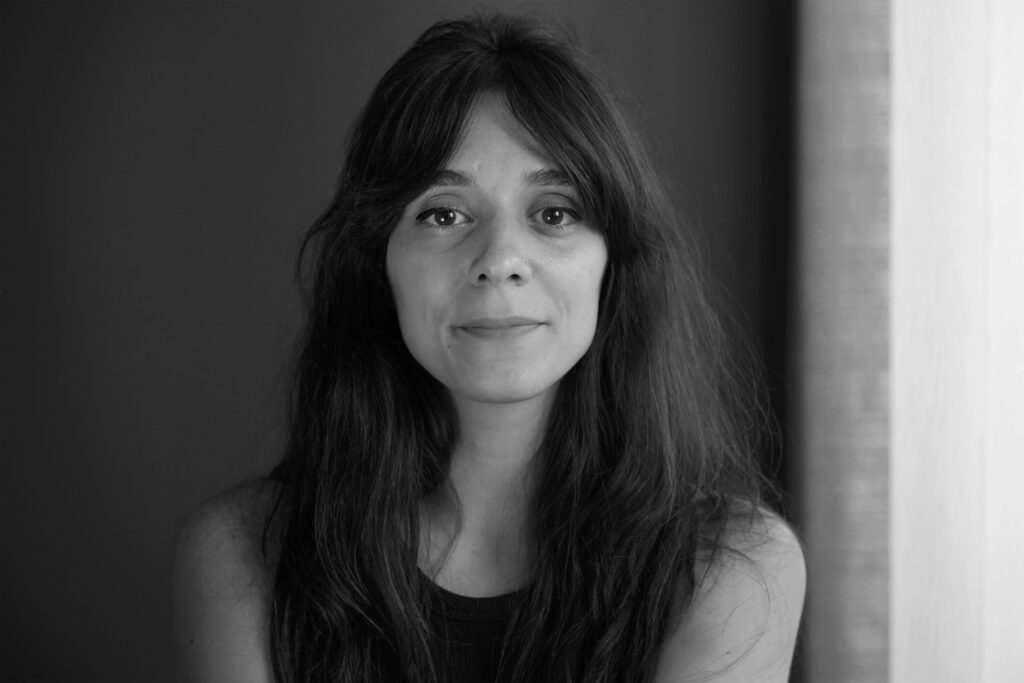 Sareen Hairabedian | Courtesy of Sareen Hairabedian
Sareen Hairabedian | Courtesy of Sareen Hairabedian
Though children never start wars and consequently have no capacity to end wars, they often are the forgotten victims who silently suffer to the highest degree. Why are they ignored, despite being the sole group that has absolutely no hand in the warfare plaguing their homes? This is the question filmmaker Sareen Hairabedian sought to answer with her documentary My Sweet Land (Տունս քաղցր ա).
As a great-grandchild of Armenian Genocide survivors, Hairabedian carries deeply-rooted generational trauma from her ancestors’ exile from their indigenous lands. Her family found refuge in the Middle East, where she grew up in a small Armenian community in Jordan. Despite its size, Hairabedian recalls attending schools where she recited nationalistic poems about stolen lands that would one day be liberated.
“Nothing and no one has been freed,” she wrote in her director’s statement. These feelings and questions surrounding generational trauma brought her to Artsakh — historically Armenian, yet possessing an unfortunate fate colonized by a corrupt government that endorses greed over culture. “The story that started to unveil before my camera was about the generational cycle of trauma that kept the resilience of a people alive while passing down the burdens of war to its children. That’s when I met Vrej,” she said.
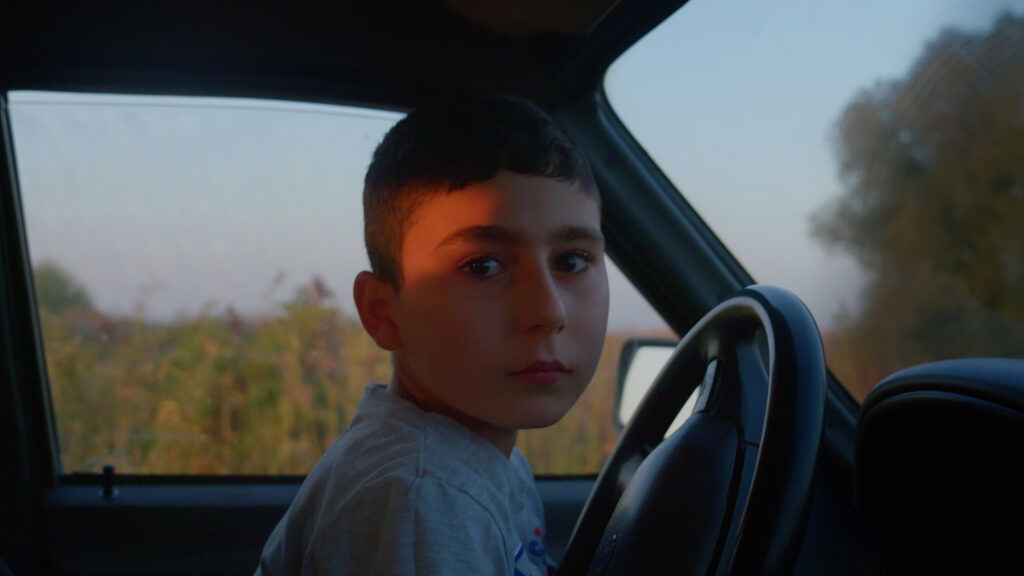 Still of Vrej from My Sweet Land | Courtesy of Sareen Hairabedian
Still of Vrej from My Sweet Land | Courtesy of Sareen Hairabedian
Structured as an agonizingly raw — and to most, unrelatable — coming-of-age story, My Sweet Land follows 11-year-old Vrej, an Armenian boy growing up in the Republic of Artsakh, the now dissolved Armenian breakaway state. Set against a “picture-postcard village with its roaming ducks and golden bees,” viewers learn who Vrej is from snippets Hairabedian pulls from his life: his fears, hopes and goals. Vrej’s willingness to share the depths of his character with Hairabedian speaks volumes about who she is, both as a person and as a filmmaker.
“We live in a country where war is expected to start at any moment,” Vrej earnestly shares with Hairabedian. “I don’t want my children to witness war. I may experience it, but I don’t want that for my children.” It is unbearable to hear a child who is experiencing the destructive — both physically and emotionally — hardships of war express such a wish. No child should ever have to bear this responsibility. No child should ever have to think these thoughts.
Though primarily pushed by her Armenian identity to take on the film, Hairabedian came to the idea after completing her 2018 project, We Are Not Done Yet, an HBO documentary that profiles various veterans and active-duty service members coming together to work through their post-traumatic stress disorder through art and poetry. She visited Artsakh for the first time around the same time that year.
“Right after that project, I felt an urgency to tell the story of people still fighting for their identity and of children born in a place where they have no choice but to join and protect their homeland. For me, it’s always connected deeply with my heritage,” Hairabedian told the Weekly.
“The traumatic path we’ve lived as Armenians — even from being the grandchildren of genocide survivors — continues today. I wanted to tell the stories of this new generation of Armenians fighting for a peaceful sky.”
As the idea brewed, Hairabedian stumbled upon a photo of hundreds of couples in 2008 at a mass wedding in Artsakh. Curious about where these families ended up, she felt it would be a great access point to the region. She and Azza Hourani, producer and Hairabedian’s long-time collaborator, connected with a local fixer and met around 30 families. Her camera gravitated towards Vrej’s family in Martakert, and she began to document their journey.
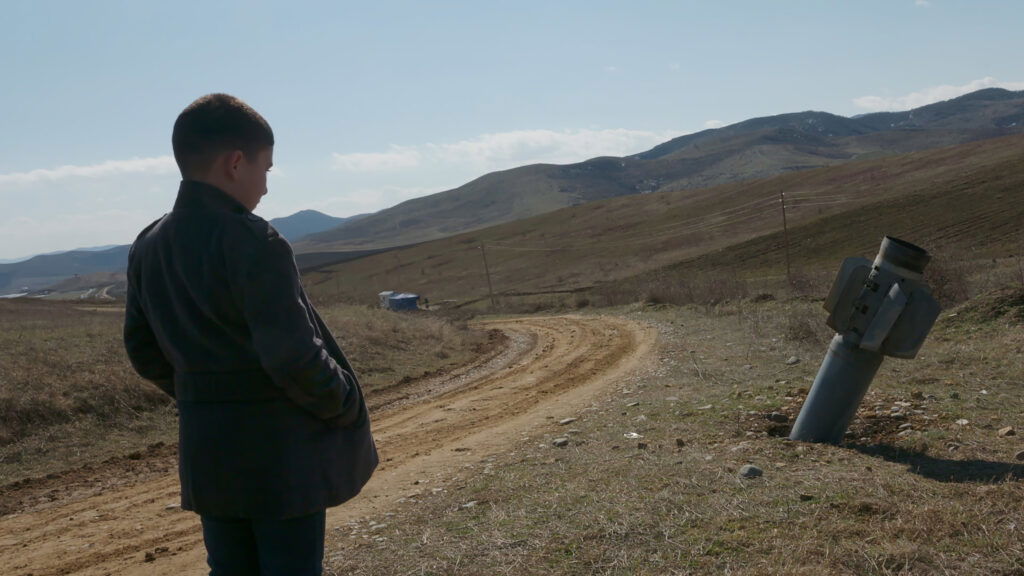 Still of Vrej from My Sweet Land | Courtesy of Sareen Hairabedian
Still of Vrej from My Sweet Land | Courtesy of Sareen Hairabedian
Though viewers see Artsakh through Vrej’s childlike wonder, it is still evident that his sweet land is not as paradisiac as it seems. For one, remnants from previous wars — such as mines — litter the country, previous wars that remain unrecognized, unsupported and ignored by the world. Vrej shows an understanding of these delicate issues, guiding Hairabedian through the sites where these missiles remain and their concomitant desolation. Even as a young boy, he asks, “How can you live with a neighbor who wants to take your country?”
This is a world completely separate from Armenians who don’t experience it everyday. We feel it, but war has never touched our skin. Vrej knows this pain, and in a manner wise beyond his years, is able to explain it to Hairabedian, who immerses herself in his world and becomes imperceptible amidst the routine village hustle and bustle. This resulted in around 500 hours of raw footage that followed a completely unscripted and unstaged format.
“The process was very organic. I kept returning to the region every few months, filming as the story unfolded,” said Hairabedian.
Then, the war struck in the fall of 2020. As a child experiencing inexplicable devastation, confronting it is difficult, but tragically, commonplace. Forced to flee Artsakh, Vrej and his family spend their days in exile — hopeful, but restlessly waiting for a sign of victory…for a sign to return home.
“The war happened, and the urgency to tell the story grew even stronger,” Hairabedian explained, a palpable shift in her tone. “The family was very open with me during their most vulnerable times, strengthening our bond.”
In the documentary, we see a young Vrej raise a toast at family dinner, stating, “I toast for our soldiers to be safe and return home. I wish for the war to end, for all of us to go back home.” We see the exhaustion in the eyes of the adults at the table as optimism shines through Vrej’s voice. It is heartbreaking to think that the same enervation the adults feel might one day be Vrej’s point of view…fatigued, weary and disappointed at the same unjustifiable outcome each time.
When Armenians lose the war, Vrej returns to his village, with many changes in his life: altered power dynamics, the post-war devastation and an education that centers children’s preparation for looming conflicts.
Finding the balance was difficult for Hairabedian. Demonstrably, the war was rooted in politics, so incorporating some contextual information was important. Historical context was threaded into the editing to showcase the cycle of trauma and resilience through the different generations of Armenians. However, since the purpose of the documentary was to capture the conflict from a child’s vantage point, she believed it was necessary to maintain the integrity of that purpose.
Whatever the children absorbed from the news or the radio was kept in, ensuring that the story was focused and specific. Hairabedian had no interest in informing the children or establishing political dynamics. Vrej’s — and the other children’s — perspective was paramount. She was not going to tell their story for them.
“Children are always the focus. Staying away from excessive political explanations was crucial, because the noise of politics is always present,” Hairabedian explained. “I hoped to provide a deep, emotional connection with one child’s journey, showing the range of their experiences. Beyond the film, my goal is to connect with impact work that helps these children process their experiences through art and writing.”
These details contributed to the observational style of Hairabedian’s cinematography. It was a specific choice, done to achieve a level of visual storytelling that is immersive for the viewer. Being a solo filmmaker was powerful, because it allowed for a seamless relationship building process.
“Observation was my direction from the start, because I didn’t want to interfere. It was about patience and building relationships with the family, the village, the school,” she said. “By the end of filming, I was very much a part of the community, making myself almost invisible. This approach allowed me to capture genuine moments.”
Hairabedian shared that the actual filming process was difficult. As a war ravaged on, constant border changes came with it. She had to find “creative ways to move equipment” to guarantee the telling of this critical story.
“Sometimes, we had to send our gear separately and enter with minimal equipment. Trusting the local community was crucial,” she explained. “We adapted to the situation, keeping our filming intimate and close to the family’s story, avoiding large-scale shots that would have required more visibility and potentially more risk.”
Though the film is undoubtedly a powerful and emotional watch for Armenians, it serves as both a documentation of history and a tool for advocacy in communities outside of the one it directly impacts. The premiere of the documentary at the Sheffield International Documentary Festival in England on June 13 — and thereafter screened on the 14th and 15th — made it evident that international audiences are often unaware of the region and its issues. The film raises awareness and initiates dialogue, highlighting the need for support and education for children affected by conflict.
This makes Hairabedian’s role beyond that of a filmmaker, especially when the final product has an impact outside the theater.
“Always ask yourself if you’re the right person to tell the story and in what capacity. Building trust with your subjects is crucial. Revisit this question constantly to ensure you’re making ethical decisions,” she said when asked what advice she has for filmmakers interested in documenting conflict zones. “Keep communication open with your subjects, preparing them for what to expect. Organize your paperwork, get releases on the spot, and never give up despite rejections. Persistence is key.”
The team behind the masterful documentary includes: director, producer, cinematographer and editor Sareen Hairabedian; producer and sound recordist Azza Hourani; co-producer Julie Paratian; co-producer David Rane; executive producer Beth Levison; and executive producer Hallee Adelman. The film also includes a soundtrack by Armenian jazz pianist and composer Tigran Hamasyan, whose composition enriches the already-emotional story.
My Sweet Land has been selected to premiere in the Amman International Film Festival in Jordan.
Those interested in seeing the film can find updates and screening information on the film’s website and on social media: Instagram, Facebook, and X.
Author information
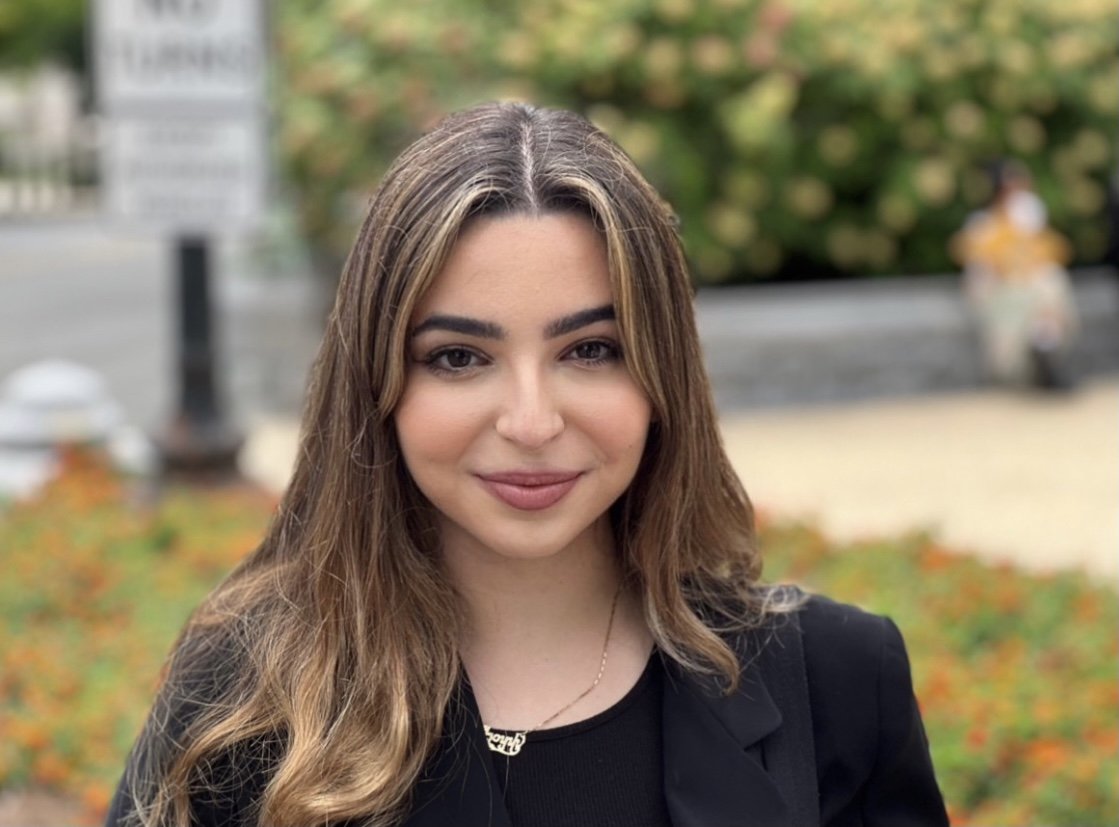
Melody Seraydarian
Melody Seraydarian is a journalist and undergraduate student at the University of California, Berkeley, pursuing a degree in Media Studies with a concentration in media, law and policy. Her column, “Hye Key,” covers politics, culture and everything in between from a Gen-Z perspective. She is from Los Angeles, California and is an active member of her local Armenian community.
The post Sareen Hairabedian’s documentary “My Sweet Land”: One Armenian child’s perspective appeared first on The Armenian Weekly.
The decision by Armenian Prime Minister Nikol Pashinyan to hand over the four villages of Baghanis, Voskepar, Kirants and Berkaber in the Tavush province to Azerbaijan has been described in a variety of ways, with some calling the decision a treacherous action by the government, while others referring to it as a key step towards the normalization of ties between the two countries. While I was trying to understand which perspective is right and which is wrong, I received a message from one of my international friends from Luxembourg. She asked what was happening in Armenia and why there are such widespread protests in the country.
In response to my description of the situation, she said: “I have a question though; what is Armenia getting in return for ceding these villages to Azerbaijan? Because so far I only understand that Armenia is giving in to Aliyev’s demands and making compromises, but maybe it just hasn’t been highlighted by the media what Armenia gets. Except for promises of ‘peace,’ but…”
I told her that, even after all the territorial concessions, there is still not a guarantee of peace. “The authorities only speak about a possible reduction in the likelihood of war,” I said.
What my Luxembourg friend texted me a few days after that conversation is what I would like readers, and hopefully the Armenian authorities, to pay attention to.
“Milena, I’m reading this part of an article (unrelated to the situation in Armenia), and I feel it really describes metaphorically what is happening in Armenia.”
Then, she sent me this excerpt from the article:
“During the Peloponnesian War, the Athenians were warned of the consequences they would suffer were they to give in to initial Spartan demands. Greek statesman Pericles told his fellow Athenians that if they were frightened into obedience by the initial demands of the Spartans in order to avoid war, then they would instantly have to meet a greater demand. Actually, contained in the Spartans’ demand was actually a test of the Athenians’ resolve. And if they give in once, they would have to give in again, and ultimately they would be enslaved. On the other hand, a firm refusal would make the Spartans clearly understand that they must treat the Athenians more as equals.”
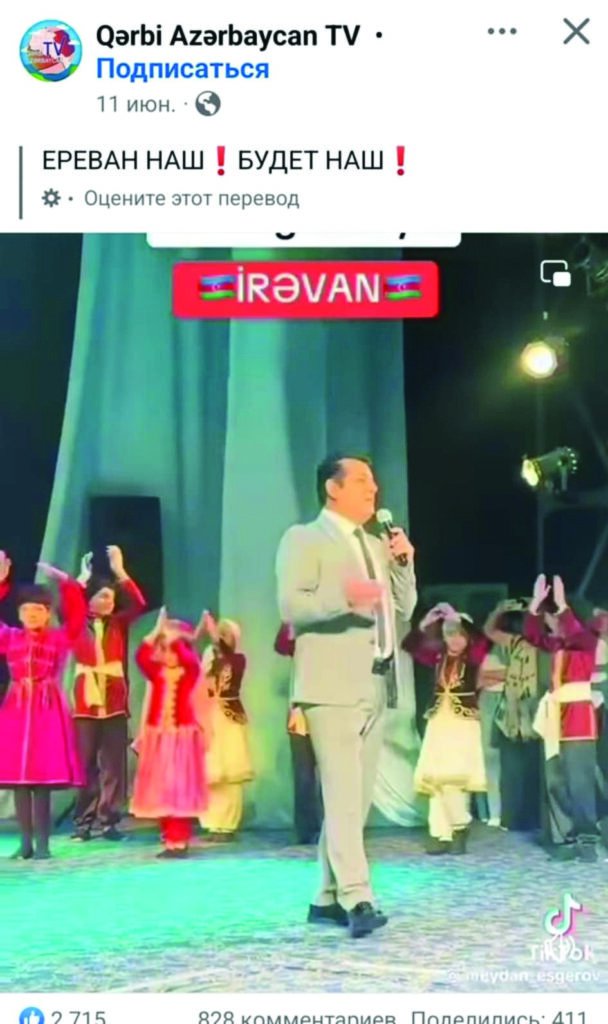 Yerevan is ours and will be ours, Azerbaijan (screenshot)
Yerevan is ours and will be ours, Azerbaijan (screenshot)
I couldn’t think of a better parallel than what this excerpt sent by my friend describes. Azerbaijani President Ilham Aliyev has been testing Armenia’s red lines continuously, and we seem to show continuously that we have none. By giving in to every new demand, we lose in three ways. First of all, we lose lands, the lands for which our fathers and grandfathers sacrificed their lives. Second, we lose important strategic heights, which could be of major help and significance in case of new aggression. According to ArmInfo, “In addition to vital communications, the four villages also play a crucial role in Armenia’s strategic defensive posture. Armenia currently holds strategic heights and well-developed defensive lines along this part of the border. Tavush stands out as the only region with superior defensive positioning over Azerbaijan compared with other border areas, which can explain Azerbaijan’s strong desire to obtain the villages, potentially facilitating the conquest of the entire country.” With this information, one realizes that the handing over of the four villages and the loss of crucial strategic points might not only not reduce the likelihood of a new war but actually facilitate one — one in favor of Azerbaijan and one that will be costly (perhaps even detrimental) for Armenia. Third, Armenia loses in a game of strategic maneuvering, in which Azerbaijan’s probing tactics are aimed at testing Armenia’s political, territorial and ideological red lines.
From the handing over of the four villages to his calls for a new constitution, Pashinyan’s steps align with Aliyev’s demands, expectations and wishes, making it seem like we are ready to sacrifice everything just to avoid war. Meanwhile, Azerbaijan is getting everything it wants without a war anyway, while strengthening its positions and increasing chances of its victory in case it does decide to start a war against Armenia. What was once wishful thinking for Azerbaijan is now a sad reality for Armenia. We keep losing and losing, and Azerbaijan keeps proving the proverb that “appetite comes with eating.” The question “which ‘dish’ on the menu will be ordered next” still puzzles me. Simultaneously, news such as, “A second Azerbaijani government-organized ‘Return to Western Azerbaijan’ festival is happening in Nakhichevan, featuring exhibits on 11 districts of ‘Western AZ,’ which is Armenia” still pop up on my feed, despite continued efforts by the Armenian authorities to “normalize relations” and establish lasting “peace.”
I do not support war, and I do want peace. However, I do not believe that what is currently happening between Armenia and Azerbaijan is a peace-building process. It is a process of humiliation, a process of imposing demands and requirements, a process of being afraid and choosing flight from the fight-or-flight response.
This is a process of forgetting who we were, who we can possibly be. It is a process of disregarding our strengths and exaggerating our weaknesses while overestimating the adversary’s power capabilities and creating an image of Azerbaijan as an unbeatable adversary — as if a few years ago we weren’t celebrating the Armenian liberation of Shushi and our indisputable victory against Azerbaijan.
Peace imposed is not peace lasting. It is impossible to establish lasting peace in an environment of mutual hatred and hostility. The continuous demands by Azerbaijan and the continued losses for Armenia, coupled with the aggression during the recent Artsakh wars, Azerbaijan’s torture and inhumane treatment of Armenian prisoners of war and Aliyev’s attempts at political and moral humiliation, increase the negative sentiments among Armenians towards Azeris, making the idea of peace displeasing and sickening, as it seems to be offered to us at the expense of our dignity. This is what the authorities in both Armenia and Azerbaijan, as well as the international community, which continues welcoming and supporting the ongoing attempts at peacebuilding, need to acknowledge and take into full consideration when approaching the matter. For peace to last, it has to be negotiated between and not imposed on one of the sides. Otherwise, we might end up in a situation where peace imposed is war enhanced.
Author information

Milena Baghdasaryan
Milena Baghdasaryan is a graduate from UWC Changshu China. Since the age of 11, she has been writing articles for a local newspaper named Kanch (‘Call’). At the age of 18, she published her first novel on Granish.org and created her own blog, Taghandi Hetqerov (‘In the Pursuit of Talent’)—a portal devoted to interviewing young and talented Armenians all around the world. Baghdasaryan considers storytelling, traveling and learning new languages to be critical in helping one explore the world, connect with others, and discover oneself. After completing her bachelor’s degree in Film and New Media at New York University in Abu Dhabi, Milena is currently enrolled in an advanced Master of Arts program in European Interdisciplinary Studies at the College of Europe in Natolin.
The post Azerbaijan is testing Armenia’s red lines appeared first on The Armenian Weekly.
YEREVAN—Armenian Prime Minister Nikol Pashinyan recently criticized the opposition movement, claiming that it fails to connect with the true sentiments of the Armenian populace and falls short in resonating with the essence of Armenia as perceived by its people.
“In essence, the opposition’s failure underscores their inability to understand and reflect the true spirit of Armenia,” Pashinyan remarked during a meeting with members of the ruling Civil Contract party in Hankavan on June 22.
In response to Pashinyan’s critique, Archbishop Bagrat Galstanyan of the “Tavush for the Homeland” movement reaffirmed the movement’s commitment to what he described as a national liberation struggle. He expressed his dedication to countering any efforts aimed at undermining Armenia’s sovereignty and to advancing the interests of the Armenian people.
“Our mission is not merely oppositional but a national liberation struggle across all fronts. While the government aims to destabilize Armenia, we stand firm in safeguarding our national interests,” stated Archbishop Galstanyan during the latest gathering of the movement on June 23.
Garnik Danielyan, a member of the “Armenia” faction in the National Assembly, countered PM Pashinyan’s assertion that the opposition movement has waned, suggesting that Pashinyan’s remarks were aimed at reassuring Civil Contract party members of his control.
In an interview with the Weekly, Danielyan remarked, “Pashinyan’s claim that the movement has diminished is merely to convey to his party members that everything is managed. His next step is to replicate unilateral concessions akin to those made in Tavush, now targeting the Ararat region, specifically in Tigranashen.”
Danielyan said that by downplaying the movement’s vigor, Pashinyan aims to deter public dissent against his ongoing unilateral concessions to Azerbaijani President Ilham Aliyev.
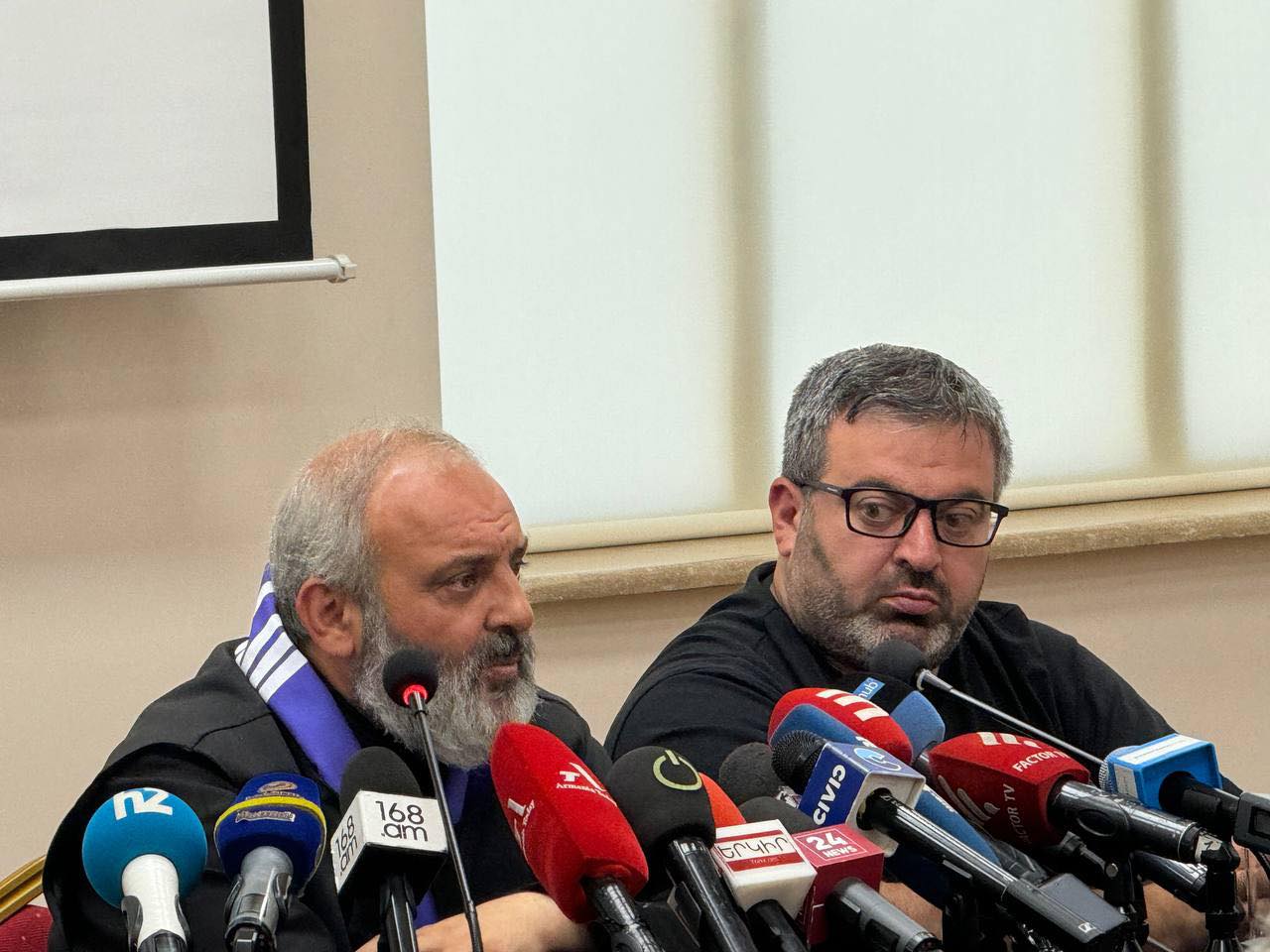 Archbishop Bagrat Galstanyan with MP Garnik Danielyan at a joint press conference (“Tavush for the Homeland,” June 19, 2024)
Archbishop Bagrat Galstanyan with MP Garnik Danielyan at a joint press conference (“Tavush for the Homeland,” June 19, 2024)
During the meeting in Hankavan, Pashinyan stated that Azerbaijan’s ongoing hostility remains a significant challenge that his administration must navigate. “In essence, Azerbaijan’s stance can be summarized as: ‘You denied me peace for 30 years, now I will deny it to you and seek revenge,’” Pashinyan remarked, highlighting the complexities in managing bilateral relations.
Pashinyan’s remarks faced immediate criticism from Armenia’s opposition factions, who vehemently oppose his policies, which they say led to Azerbaijan’s gains in the 2020 Artsakh War and subsequent territorial acquisitions.
“The prime minister’s approach effectively advocates capitulation to avoid conflict, but this jeopardizes our national sovereignty,” Artur Khachatryan of the “Armenia” faction told RFE/RL’s Armenian Service on June 24. “To safeguard our future, we must defend our borders and uphold our principles.”
Opposition figures, including Hayk Mamijanyan, parliamentary leader of the “I Have Honor” faction, said that Pashinyan’s strategy compromises national security and the memory of Armenian martyrs. They accused him of undermining Armenia’s statehood by prioritizing peace at any cost.
In reaction to Pashinyan’s assertion that Azerbaijan is seeking revenge for past grievances, Danielyan emphasized that this sentiment extends to an existential threat against Armenia.
Danielyan pointed to Azerbaijan’s promotion of the concept of “Western Azerbaijan” and support for organizations that make territorial claims that directly challenge Armenian sovereignty. These developments are evidence of Azerbaijan’s broader political agenda, which has also become Pashinyan’s agenda, aimed at undermining Armenia’s territorial integrity and national sovereignty, Danielyan argued.
Meanwhile, Armenia’s political leadership has been actively discussing the prospect of applying for European Union (EU) membership, said Arman Yeghoyan, chairman of the Armenian parliamentary committee on European integration, on June 21.
“The ruling majority of Armenia is seriously deliberating whether to submit an application for EU membership, and the government will make a formal announcement at an appropriate time upon reaching a decision,” stated Yeghoyan.
The idea was initially broached by Parliament Speaker Alen Simonyan in late February, against the backdrop of strained relations between Armenia and Russia. Prime Minister Pashinyan reportedly engaged with parliament deputies from the Civil Contract party in subsequent discussions on the matter.
This week, several pro-Western fringe groups aligned with Pashinyan rekindled the debate, urging the government to conduct a referendum within the next three months to gauge public sentiment towards an EU membership bid.
In response, the Armenian Parliament, controlled by the ruling party, promptly convened hearings on the proposal. Yeghoyan, following the six-hour session he chaired, approached the idea of a referendum cautiously. He emphasized that such a vote could only proceed after Yerevan formally applies for EU candidate status and receives positive signals from Brussels.
An EU membership bid would likely require Armenia’s withdrawal from the Russian-led Collective Security Treaty Organization and Eurasian Economic Union, which currently provides Armenian exporters with tariff-free access to Russia’s substantial market.
Moreover, in response to persistent pressure from Azerbaijan to amend Armenia’s constitution, PM Pashinyan has also issued a directive to draft an entirely new constitution by December 30, 2026. This decision marks a significant shift from earlier efforts by a constitutional reform council, which had been tasked with proposing amendments rather than a complete overhaul.
The council, established in 2022, had been advancing a set of amendments throughout the year, with the initial draft submitted to the government in January. However, Pashinyan’s latest directive explicitly mandated the creation of a “new constitution” rather than amendments, raising questions about the fate of the council’s previous work.
Artur Sakunts, a member of the council, expressed surprise at the decision, noting it was issued on May 24 and posted on the government’s website without prior discussion with the council. He emphasized the need for clarity on whether the council’s ongoing efforts would be discarded or integrated into the new draft.
Azerbaijan’s demand for constitutional change stems from what it perceives as a territorial claim in Armenia’s Declaration of Independence, which mentions the unification of Armenia and Artsakh. Despite Azerbaijan’s insistence, Armenian authorities maintain that internal constitutional matters are not subject to external demands, the Ministry of Foreign Affairs recently reaffirmed.
The debate within Armenia has intensified over whether to retain references to the Declaration of Independence in the new constitution. While many argue that it symbolizes Armenia’s historical aspirations, others, like PM Pashinyan, continue to warn of potential diplomatic repercussions and the risk of renewed aggression from Azerbaijan.
Vladimir Vardanyan, another council member, declined to clarify whether the previous draft would be abandoned or revised, adding to the uncertainty surrounding the process. Meanwhile, Daniel Ioannisyan, also a council member, stressed the need for extensive public consultation before any decision on the Declaration of Independence is made.
Author information
Hoory Minoyan
Hoory Minoyan was an active member of the Armenian community in Los Angeles until she moved to Armenia prior to the 44-day war. She graduated with a master’s in International Affairs from Boston University, where she was also the recipient of the William R. Keylor Travel Grant. The research and interviews she conducted while in Armenia later became the foundation of her Master’s thesis, “Shaping Identity Through Conflict: The Armenian Experience.” Hoory continues to follow her passion for research and writing by contributing to the Armenian Weekly.
The post Armenian Prime Minister criticizes opposition as national debates intensify appeared first on The Armenian Weekly.

